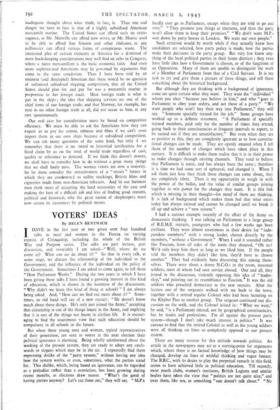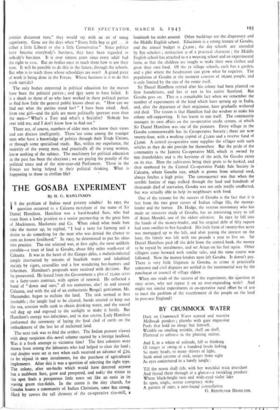VOTERS' IDEAS
By HELEN BENTWICH I HAVE in the last year or two given over four hundred talks to men and women in the Forces . on varying aspects of Citizenship, including the whole of the British
Way and Purpose series. The talks are part lecture, part discussion, and invariably , I am asked—" Well, where do we come in? What can we do about it?" So that in every talk, at some stage, we discuss the relationship of the individual to the Government, and the influence of the individual on the policy of the Government. Sometimes I am asked to come again, to tell them
"How Parliament Works." During the two years in which I have been giving these talks I have found a growing interest in this kind of education, which is shown in the keenness of the discussions. "Why didn't we learn this kind of thing at school?" I am always being asked. And, "How can we find out more about it?" Some- times, an old hand will say of a new recruit: "He doesn't know much about these things. He's only just joined the Army," accepting that citizenship is one of the things learnt in the Army, and implying that it is one of the things not learnt in civilian life. It is encour- aging to find the unanimous view that such education should be compulsory in all schools in the future.
But when these young men and women, typical representatives of their generation, are seen as voters in the next election their political ignorance is alarming. Being wholly uninformed about the working of the present system, they are ready to adopt any catch- words or slogans which may be in the air. I repeatedly find them expressing dislike of the "party system," without having any idea how the system works, or even, sometimes, what the parties stand for. This dislike, which, being based on ignorance, can be regarded as a prejudice rather than a conviction, has been growing during recent months, as elections draw nearer. "What's the good of having parties anyway? Let's cut them out," they will say. "M.P.s hardly ever go to Parliament, except when they are told to go and vote." "They promise you things at elections, and then the party won't allow them to keep their promises." "We don't want M.P.s sent down by party bosses in London. We want our own people."
Such criticism would be worth while if they actually knew how candidates are selected, how parly policy is made, how the parties make their decisions in the party group. But very few know any- thing of the local political parties in their home districts ; they even have little idea how a Government is chosen, or of the functions of an Opposition. Many of them are unable to distinguish the work of a Member of Parliament from that of a Civil Servant. It is my task to try and give them a picture of'these things, and tell them something about the historical background.
But although they are thinking with a background of ignorance, some are quite certain what they want. They want the "individual" whom you elect "because you believe in him," and who "goes to Parliament to obey your orders, and not those of a party." "We want people who won't buy their way into Parliament," they will say. "Someone specially trained for the job." Some groups have worked up to a definite statement. "A Parliament of specially trained members, paid only for the number of times they attend, going back to their constituencies at frequent intervals to report, to be turned out if they are unsatisfactory." But even when they are as positive as this, they are completely ignorant as to how constitu- tional changes can be made. They are openly amazed when I tell them of the number of changes which have taken place in this century. It is difficult to make them realise that it is in their power to make changes through existing channels. They tend to believe that Parliament is static, and has always been the same ; therefore it is time we had some sort of upheaval, and changed it. When I ask them just how they think these changes can come about, they are completely silent. • Then is my opportunity to weigh in with the power of the ballot, and the value of similar groups joining together to win power for the changes they want. It is this link which is missing in their thought—for mang of them are thinking. It is lack of background which makes them feel that what exists today has always existed and cannot be changed until we break it all up and achieve a "new system."
I had a curious example recently of the effect of the Army on democratic thinking. I was talking on Parliament to a large group of R.E.M.E. recruits, youngsters who had a few weeks ago been civilians. They were almost unanimous in their desire for "inde- pendent members," with a strong leader, chosen directly by the members, "without a Government." When I said it sounded rather like Fascism, from all sides of the room they shouted, "Oh no We'd only keep him there as long as we liked him. If the people told the members they didn't like him, they'd have to choose another." They had evidently been discussing this among them- selves. There were about a dozen N.C.O.s in the room, seasoned soldiers, most of whom had seen service abroad. One and all, they joined in the discussion, violently opposing this idea of "leader- ship," and pointing out its resemblance to Fascism.• It was the old soldiers who preached democracy to the new recruits. After the lecture one of the sergeants walked with me back to the town,
together with a retired regular Colonel who had been lecturing on the Khyber Pass to another group. The sergeant continued our dis- cussion on the walk, and the Colonel joined in: "What we want," he said, "is a Parliament elected, not by geographical constituencies, but by trades and professions. I'm all against the present party system—though I don't take much interest in politics." It was curious to find that the retired Colonel as well as the young soldiers were all thinking on lines so completely opposed to our present system.
There are many reasons for this attitude towards politics. An article in the newspapers may act as a starting-point for arguments which, where there is no factual knowledge of how things may be changed, develop on lines of wishful thinking and vague fantasy. The B.B.C., with its desire to play the perpetual eunuch in this field,
seems to have achieved little in political education. Till recently, most youth dubs, women's institutes,- British Legions and similar bodies have, taken the view that "polities are not quite nice," and treat them, like sex, as something "one doesñ'tl talk about." "No
politics discussed here," they would say with an air of smug superiority. Gone are the days when "Every little boy or girl . .. is either a little Liberal or else a little Conservative." Since politics have become everybody's business, they have been regarded as nobody's business. It is over sixteen years since every adult had the right to vote. But no bodies exist to teach them how to use their vote. It will be possible to do this in the future, through the schools. But who is to teach those whose schooldays are over? A grand piece of work is being done in the Forces. Whose business is it to do this work outside?
The only bodies interested in political edueation for the masses have been the political parties ; and tliey seem to have failed. It is a shock to those of us who have worked in these political parties to find how little the general public knows about us. "How can we find out what the parties stand for?" I have been asked. And, from one girl—and the girls are more politically ignorant even than the men—" What's a Tory and what's a Socialist? Nobody has ever told me, and I don't know how to find. out."
There are, of course, numbers of older men who know their views and can discuss intelligently. There are some among the younger men who have a knowledge of politics through their Trade Unions, or through some specialised study. But, within my expeiience, the majority of the young men, and practically all the young women, knew nothing of the subject. The machinery for political education in the past has been the elections ; we are paying the penalty of the political truce and of the nine-year-old Parliament. Those in the Forces are being helped in their political thinking. What is - happening to those in civilian life?



























 Previous page
Previous page